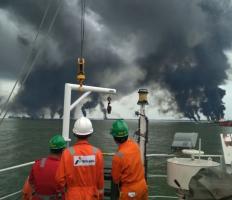
Photo: Pertamina
Six days ago, oil began spilling into Borneo’s Balikpapan Bay. The oil would spread to cover an area of nearly 13,000 hectares and pollute 60 km of coastal ecosystems, including mangrove wetlands and marine mammal habitats. At least one protected dugong was killed. The spill would also create an overpowering stench sweeping across Balikpapan, a city of 700,000 people. On March 31, the oil caught fire near the Panama-flagged bulk carrier, MV Ever Judger. At least four fisherman died and a fifth remains missing. One of the crew members on the bulker also suffered burns.
Where did the oil come from? For the first four or five days, there was only denial and finger-pointing.
The only oil refinery in the area is owned by the Indonesian state-owned oil company, Pertamina. Initially, Pertamina officials denied that the refinery or its pipelines had anything to do with the spill. They said that testing of the oil indicated that it was marine fuel and not crude oil from their facility. Balikpapan is a busy port serving one of Indonesia’s biggest thermal coal mining regions. Nevertheless, there were no reports of ship casualties which might have caused a such a large spill. Local police questioned the crew and took fuel samples from the MV Ever Judger in Balikpapan Bay. The samples were sent ashore for analysis.
For the next several days, the refinery, Pertamina Unit V, continued operating as usual while the spill continued to grow. Finally, on Wednesday, the oil company identified the source of the spill — a cracked 20-year-old underwater pipeline from to its refinery in Balikpapan. Pertamina says its sonar equipment revealed the punctured pipeline had been moved 100 meters from its original position.
The oil company is now suggesting that a bulk carrier loaded with coal may have snagged the pipeline with its anchor. Reuters quotes Oil and Gas Director General Djoko Siswanto: “We suspect the pipe was dragged by the ship that caught fire. At the time it was bad weather, so they had to drop anchor,” Siswanto said, noting it was an area where ships were not supposed to anchor. Siswanto did not identify the vessel but said it was a coal ship with a Panama flag.

Why bother accept responsibility when some one else is to blame for your mistakes? The world is becoming a sad place when no one wants to be responsible for their inactions.
All involved should sort out the problem first, then work out who’s fault it was and who pays later. That way you minimise damage to the environment.
Can’t have been caused by us so we’re not going to do anything should not be a possible response.
Some believe that dugongs were the inspiration for ancient seafaring tales of mermaids and sirens.
Dugongs are related to manatees and are similar in appearance and behavior— though the dugong’s tail is fluked like a whale’s. Both are related to the elephant, although the giant land animal is not at all similar in appearance or behavior.
Underwater Behavior
Dugongs graze on underwater grasses day and night, rooting for them with their bristled, sensitive snouts and chomping them with their rough lips.
https://www.nationalgeographic.com/animals/mammals/d/dugong/